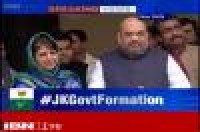Mystery of the missing edits
Why are some topics ignored in edits? Why does science rarely feature?
Editorial writer T.C.A. SRINIVASA-RAGHAVAN ruminates on this mystery (Pix: Mehbooba Mufti~s meeting with Amit Shah on February 24).

As a devoted reader of the Hoot, and especially its gentle malice, I have a particular liking for Darius Nakhoonwala’s nasty little columns because, as an edit writer throughout my journalistic career, it was most gratifying when about 10 years ago someone decided to take on the genre. High time too, I thought.
Just when the column was gathering steam, around 2009, Mr Nakhoonwala stopped writing for a while. But I am glad he has resumed now. But it must be said that he is wasting his time somewhat. Editorials, as he himself points out often enough, aren’t that important any more.
That said, in the 33 years that I spent writing edits, sometimes as many as four or five a week, one problem always bothered me: how worthy was the process by which we chose the topics? In retrospect, I would say that it was pretty whimsical, the whimsy obviously being that of the editor.
And that brings me to the point of this article. It is something at which Mr Nakhoonwala often marvels: how do some fundamentally important subjects get left out? What was the editor smoking?
What, no edit?
Let me cite the most recent example. The agreement arrived at between the PDP and the BJP in Jammu and Kashmir to share power is, by any token, one of the most important developments of the decade. Its long term implications are, if I may use a colloquialism, mind boggling.
Yet, you know what? I was astonished that this week when the agreement was reached, several major newspapers didn’t think it worth writing about. Only the Hindu, the Times of India and the Pioneer amongst the important ones thought it a fit topic to notice editorially.
And they took their time over it. In the old days, every major newspaper wrote on the same day. Silly topics caught their attention first.
This is not to say that no other paper will ever write about the J&K experiment. But what’s the point of calling yourself a newspaper which omits to write when the topic is current? Why behave like TV news which is forever seeking masala topics?
The same thing happened with the report of the 14th Finance Commission which has increased the compulsory revenue devolution from the centre to the states by a whopping 10 per cent – from 32 t0 42. Having written about four previous ones, I was looking forward to some analysis and insights.
But I found only three or four edits. The others just ignored it. I guess it was too much for them. This is not all. Science and technology are almost wholly ignored. If you count the number of edits written on these subjects, you will be lucky to find even half a dozen in a year and even those will be on the latest mobile phones.
The gaping gaps
As one of the chaps whose job it was to suggest edit topics every morning, in the early years I used to cast around for important developments in science and technology. But I stopped after a few years because generally editors were just not interested.
The exception was when the Economic Times hired a science editor in the early 1990s but his contribution to edits was about one in a month. There was always something more pressing than, say, a new way of tackling cancer or getting to a rocket to fire using less fuel or cloning a cow or whatever. You get my meaning, I am sure.
Sociology for a time became popular after V. P. Singh started his Mandal nonsense but soon fizzled out. No one ever writes on it any more even though India is changing so rapidly.
Urbanisation is another subject that not a single assistant editor has any clue about or any editor is interested in. When was the last time you read something on it? This when India is urbanising more rapidly than ever before in its history and, in the process, changing everything from economics to politics to sociology and even the thrust of scientific research.
I could go on in this vein but I think I will let you add to the topics that you don’t get to read about. They are crucially important to the country but our editors, silly buggers, couldn’t give a damn.
Such articles are only possible because of your support. Help the Hoot. The Hoot is an independent initiative of the Media Foundation and requires funds for independent media monitoring. Please support us. Every rupee helps.
Subscribe To The Newsletter






